
NTUT Journal of Intellectual Property Law and Management
Scope & Guideline
Decoding the Complexities of Intellectual Property Law
Introduction
Aims and Scopes
- Intellectual Property Law Analysis:
The journal extensively covers various aspects of IP law, including copyright, patents, trade secrets, and trademark issues. It seeks to analyze the implications of these laws in different contexts, such as technology, health, and education. - Emerging Technologies and IP:
There is a significant focus on how emerging technologies, such as artificial intelligence and digital innovations, impact IP rights and protections. The journal explores legal frameworks adapting to these advancements. - Comparative Studies:
The journal frequently publishes comparative analyses of IP laws from different jurisdictions, highlighting differences and similarities in legal approaches and their practical consequences. - Policy and Regulation:
The journal engages with policy discussions around IP, including licensing, enforcement, and the balance between protection and public interest, particularly in the context of health and education. - Interdisciplinary Approaches:
The journal encourages interdisciplinary research, integrating legal studies with insights from economics, technology, and cultural studies, to provide a holistic view of IP issues.
Trending and Emerging
- Digital Innovations and IP:
Recent publications have shown a strong trend towards exploring the implications of digital innovations on intellectual property law, including discussions on NFTs, digital copyright authentication, and the legal challenges posed by new technologies. - AI and Intellectual Property:
There is a growing interest in the intersection of artificial intelligence and IP law, particularly concerning authorship, ownership, and the legal status of works created by AI systems. This theme is becoming increasingly relevant as AI technologies advance. - Health and Intellectual Property:
The journal has seen a rise in discussions related to the intersection of health and IP, particularly in the context of pharmaceutical patents and public health rights, reflecting global conversations around access to medicines. - Educational Fair Use and IP in Distance Learning:
The impact of distance learning on copyright law, particularly regarding educational fair use, has emerged as a significant theme, driven by recent changes in educational practices due to the pandemic. - Global Perspectives on IP Regulation:
There is a notable trend towards analyzing IP regulation from a global perspective, considering international treaties and the harmonization of laws across jurisdictions, which is crucial in an increasingly interconnected world.
Declining or Waning
- Traditional Copyright Issues:
There seems to be a waning focus on traditional copyright issues that do not intersect with digital or technological advancements. The shift toward discussions on digital copyright and its complexities indicates a reduced emphasis on more conventional copyright topics. - General Patent Law Without Contextual Application:
Discussions surrounding general patent law principles without specific contextual applications (such as technology commercialization or case studies) have decreased. There is a tendency to focus more on specific case studies and practical implications. - Local IP Law without Comparative Analysis:
There appears to be a decrease in articles solely discussing local IP laws in isolation, as the journal increasingly prioritizes comparative studies that provide broader insights into global practices. - Static IP Enforcement Mechanisms:
Research on static enforcement mechanisms for IP rights appears to be declining. The journal is leaning more towards dynamic discussions that consider evolving enforcement challenges in the digital era. - Niche Areas of IP Law:
Certain niche areas of IP law, such as very specific regional practices or outdated legal frameworks, are becoming less prominent as the journal shifts its focus to more pressing and universally relevant IP issues.
Similar Journals

IOWA LAW REVIEW
Exploring the frontiers of contemporary law.IOWA LAW REVIEW is a prestigious legal journal published by the University of Iowa College of Law, dedicated to advancing the discourse in the field of law. Since its inception, this journal has become a vital resource for legal scholars, practitioners, and students, committed to publishing rigorous and thought-provoking articles that address contemporary legal challenges. With a strong emphasis on contributions from a diverse range of legal fields, including constitutional law, criminal justice, and property law, the IOWA LAW REVIEW maintains a Q1 ranking in law, reflecting its significance and influence on legal scholarship globally. While the journal is not currently open access, it provides critical insights and perspectives that are essential for understanding the evolving landscape of law. Additionally, with its ranking of #314 out of 1025 in the Scopus database, the journal demonstrates a high impact within the legal community. Scholars and practitioners alike are encouraged to engage with its scholarly articles, as they not only highlight key legal issues but also propose innovative solutions to complex societal problems.
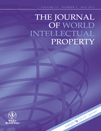
Journal of World Intellectual Property
Exploring the Global Landscape of Intellectual Property LawJournal of World Intellectual Property is a premier academic journal published by WILEY, specializing in the critical and evolving intersection of law and intellectual property on a global scale. With an ISSN of 1422-2213 and an E-ISSN of 1747-1796, this journal provides a platform for rigorous research and discussion among legal scholars, practitioners, and policymakers. The journal has garnered recognition within the academic community, achieving a Q3 ranking in the Law category and ranking #336 out of 1025 in the Scopus Law category, situating it in the 67th percentile. Covering a range of topics from international copyright to patent law, the journal aims to explore the complexities and implications of intellectual property rights as they evolve in a rapidly globalizing world. Published in the United Kingdom, this journal is accessible to those eager to contribute to and stay informed about advancements in intellectual property law from 2002 to 2024, fostering a rich dialogue among researchers, professionals, and students alike.

CATHOLIC UNIVERSITY LAW REVIEW
Bridging Law, Education, and Religious Thought.CATHOLIC UNIVERSITY LAW REVIEW is a premier legal periodical published by the Catholic University of America Press, located in the heart of Washington, D.C. with a dedicated focus on the intersections of law, education, and religious studies. Since its establishment in 1973, the journal has served as a critical platform for scholarly discourse, presenting innovative legal analysis and thought-provoking research that caters to scholars, practitioners, and students alike. With an ISSN of 0008-8390, this non-open access journal holds a notable place in the academic community, reflected by its category quartiles in 2023, ranking Q4 in Education and Law, and Q3 in Religious Studies. The Catholic University Law Review is distinguished not only by its commitment to advancing legal scholarship but also by its dedication to exploring the implications of law through a distinctly Catholic lens. Its consistent output of high-quality articles contributes to ongoing debates and developments in these fields, making it an essential resource for those interested in the legal implications of contemporary issues.
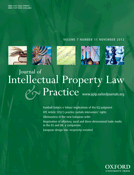
Journal of Intellectual Property Law & Practice
Shaping the landscape of intellectual property scholarship.The Journal of Intellectual Property Law & Practice, published by Oxford University Press, is a premier academic journal dedicated to the exploration and discussion of issues surrounding intellectual property law. With an ISSN of 1747-1532 and an E-ISSN of 1747-1540, this journal has established itself as an essential resource in the field, featuring high-quality articles that contribute to the advancement of legal scholarship and practice. Recognized in the 2023 Category Quartiles as Q2 in Law, the journal ranks within the top half of its field and provides a global platform for researchers, practitioners, and policymakers. Covering a comprehensive range of topics from copyright to patent law, the journal encourages interdisciplinary dialogue and aims to bridge academic and professional practice. Although it operates under subscription models, it ensures wide accessibility of its rigorous content and analysis, maintaining its significance in shaping the discourse on intellectual property law from its inception in 2005 to the anticipated 2024. This journal not only supports scholarly communication but also fosters a community committed to the dynamic challenges of intellectual property in today’s innovative landscape.
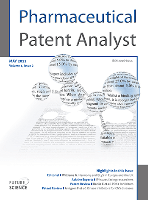
Pharmaceutical Patent Analyst
Transforming Pharmaceutical Research with Patent ExpertisePharmaceutical Patent Analyst, published by Taylor & Francis Ltd, is a premier journal dedicated to the evolving fields of pharmaceutical science and patent law. Established in 2012, this journal provides a rigorous platform for scholarly articles, analytical studies, and insightful reviews that delve into the intersection of drug discovery, pharmaceutical innovation, and intellectual property rights. With a Q2 category ranking in Pharmaceutical Science and Q3 rankings in both Drug Discovery and Medicine (miscellaneous), it is recognized for its impactful contributions to the academic community and industry professionals alike. The journal aims to enhance the understanding of patent strategies, explore emerging pharmaceutical technologies, and foster dialogue on regulatory challenges, ultimately facilitating innovation in drug development. Although it does not currently offer open access, its comprehensive and high-quality content remains essential for researchers, professionals, and students pursuing excellence in pharmaceutical research and patent analysis.
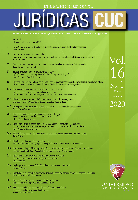
Juridicas CUC
Advancing Legal Scholarship Across BordersJuridicas CUC, published by UNIV COSTA, is a distinguished open-access journal dedicated to the field of Law, prominent since 2011. With an ISSN of 1692-3030 and an E-ISSN of 2389-7716, this journal serves as a vital resource for researchers, professionals, and students in Colombia and beyond. It holds a commendable Q2 status in Law for 2023, and its Scopus ranking places it at #425 out of 1025 in Social Sciences _ Law, reflecting its commitment to high-quality scholarship, evident in its 58th percentile. The journal aims to foster academic dialogue by publishing innovative and impactful research, contributing to the advancement of legal studies in a global context. Located in Barranquilla, Colombia, Juridicas CUC is committed to enhancing accessibility to legal research, ensuring that scholars from various backgrounds can engage with contemporary legal issues effectively.

BOSTON UNIVERSITY LAW REVIEW
Exploring the forefront of legal innovation.BOSTON UNIVERSITY LAW REVIEW, a premier legal journal based in the United States, is widely recognized for its contributions to the field of law. Since its inception in 1973, this esteemed publication, with ISSN 0006-8047, has provided a platform for rigorous scholarship and innovative discourse in legal theory and practice. Published by BOSTON UNIV LAW REVIEW, the journal is categorized in the top-tier Q1 of law journals as of 2023, reflecting its high impact and relevance in legal scholarship, backed by a solid Scopus ranking of #219 out of 1025 in Social Sciences _ Law, placing it in the 78th percentile. While not an open-access journal, it remains a vital resource for legal researchers, practitioners, and students, offering comprehensive analyses and insights that inform contemporary legal practices. With a commitment to advancing legal understanding, the BOSTON UNIVERSITY LAW REVIEW seeks to engage and inspire critical thought among its readership.
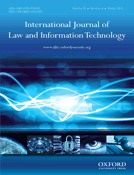
International Journal of Law and Information Technology
Transforming Legal Perspectives through Technological Insights.The International Journal of Law and Information Technology, published by Oxford University Press, stands as a leading forum for the exploration of the evolving intersection between law and information technology. With its ISSN 0967-0769 and E-ISSN 1464-3693, this esteemed journal has been at the forefront of academic discourse since its inception in 1993 and is poised to continue influencing the landscape of legal scholarship and information sciences until at least 2024. With a prestigious categorization in the Q2 quartile for both Law and Library and Information Sciences, the journal is prominently ranked in the 76th and 64th percentiles respectively within Scopus rankings. Offering insights on vital themes such as privacy, intellectual property, and technological regulation, the International Journal of Law and Information Technology provides a valuable resource for researchers, practitioners, and students alike, facilitating a deeper understanding of the legal challenges and opportunities presented by technological advancements. While not an open-access publication, the rigorous peer-reviewed articles serve to enrich the global academic community’s knowledge in this critical and dynamic field.

SOUTHERN CALIFORNIA LAW REVIEW
Pioneering Insights into Complex Legal IssuesSouthern California Law Review is a prestigious academic journal published by the University of Southern California, focusing on the expansive field of law. With an ISSN of 0038-3910 and a continuous publication record since 1973, this journal has established itself as a vital platform for legal scholarship and discourse. It holds an impressive Q1 ranking in the law category for 2023 among academic journals, reflecting its significant impact and reputation within the legal community. The journal encompasses a wide array of topics designed to foster rigorous debate and critical analysis, making it a crucial resource for researchers, practitioners, and students alike. Although currently not open access, it consistently aims to provide in-depth scholarly articles that contribute to the development and understanding of law across various dimensions. As it continues to evolve until 2024, Southern California Law Review remains an essential resource for anyone committed to exploring the nuances of legal theory and practice.
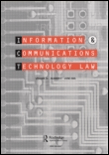
Information & Communications Technology Law
Decoding the Legal Landscape of Information TechnologyInformation & Communications Technology Law, an esteemed journal published by Routledge Journals, Taylor & Francis Ltd, serves as a vital platform for the dissemination of critical research and analysis in the intersecting fields of law, communication, and computer science. Established in 1992, this journal has continuously evolved to address the dynamic landscape of information technology and its legal implications, maintaining a significant H-Index that reflects its scholarly impact. With a notable impact factor that places it in the second quartile for communication and law disciplines, and in the third quartile for computer science applications as of 2023, it ranks impressively within the Scopus Metrics—highlighting its relevance and reach among global academia. Covering vital topics from data privacy to intellectual property rights in the digital age, the journal appeals to researchers, practitioners, and students alike by offering insightful articles that explore contemporary issues and emerging trends within ICT law. Although it does not currently offer open access options, its comprehensive articles and reviews are indispensable for anyone seeking to understand the complexities of technology regulation and legal frameworks.